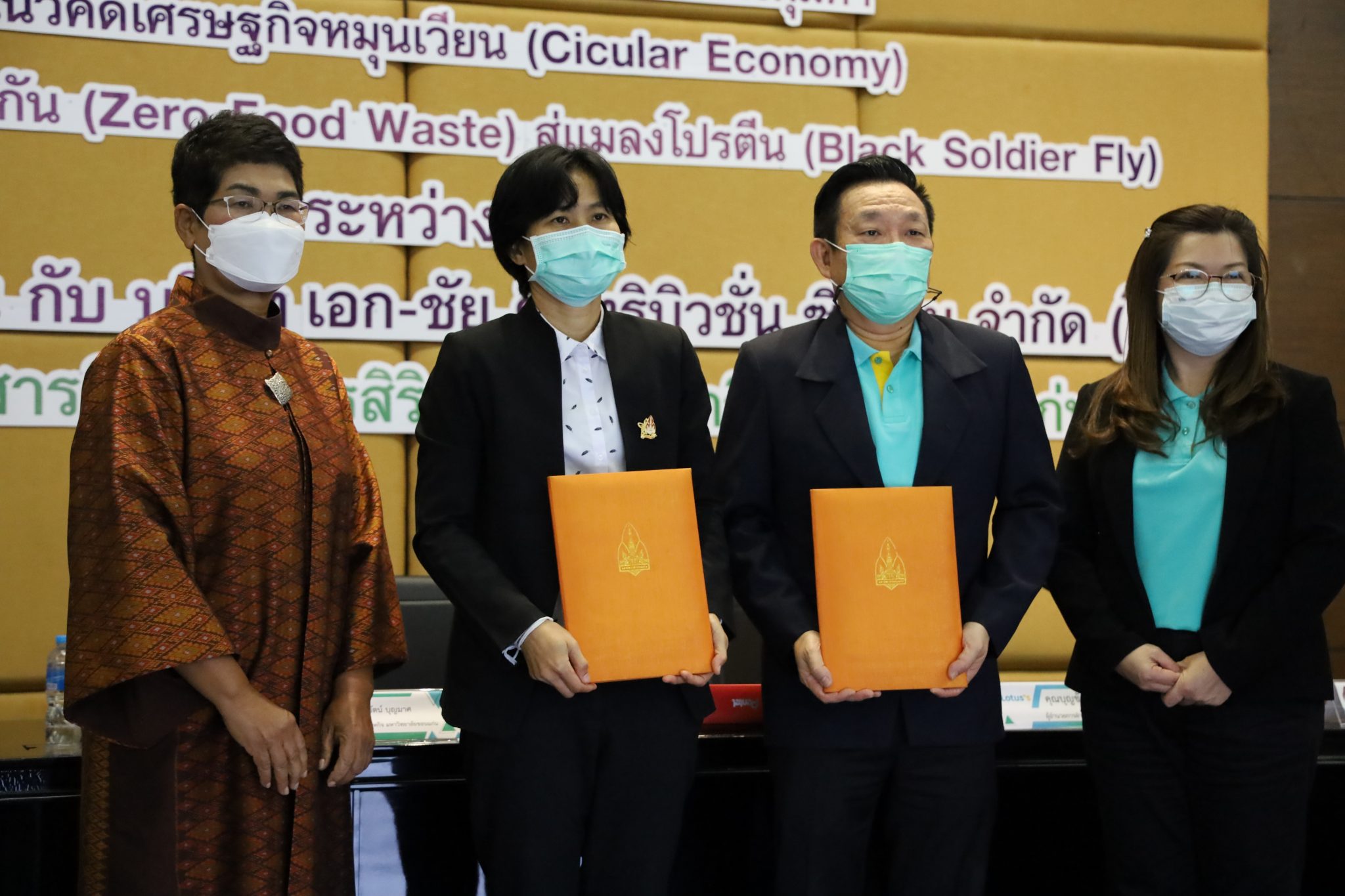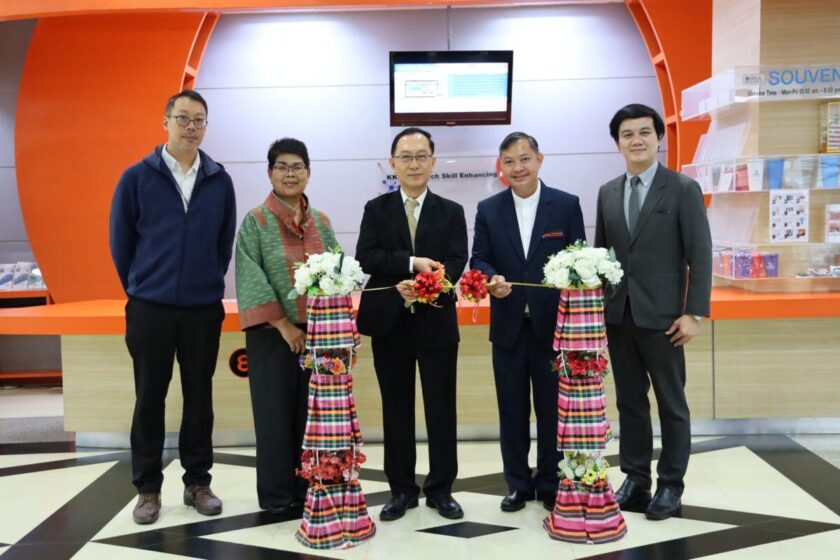Thursday August 25, 2022 at 09.00 a.m. – Prof. Thidarat Boonmars, KKU Vice President for Innovation and Enterprise signed an MOU with Mr. Boonchai Cheeparanai, Director for Northeast Retail Business, Ekkachai Distribution System, Co. Ltd., for deployment of innovations of worthwhile resource utilization according to the concept of Circular Economy. The MOU is also for extending Lotus’ Still Eatable Foods that is aimed at zero food waste to landfill by 2030. Signing as witnesses included Assoc. Prof. Darunee Chotishyangkoon, Ph.D., Dean of the Faculty of Agriculture and Khun Methiness Sae-ung, Lotus Operation Manager. The MOU signing event, held at Sarasin Room, 2nd Floor, Sirikunakorn Building, Khon Kaen University; was attended by Asst. Prof. Arwut Yimtae, Vice President for Infrastructure and Environment; Assoc. Prof. Chupong Thongkhamsamut, Ph.D., Dean of the Faculty of Architecture; Asst. Prof. Araya Chaoruangrit, Ph.D., Dean of the Faculty of Technology; Prof. Yupa Hanboonsong, Ph.D., from the Department of Entomology and Plant Diseases; Dr. Chutinan Chusai, a lecturer of the Faculty of Agriculture; a number of KKU lecturers, administrators and personnel of Ekkachai Distribution System, Co. Ltd.

Prof. Thidarat Boonmars, KKU Vice President for Innovation and Enterprise said, “The implementation on protein insects of Khon Kaen University is headed by Prof. Yupa Hanboonsong, Ph.D., from the Department of Entomology and Plant Diseases and her research team of the Faculty of Agriculture. The work is aimed at producing alternative protein for the community so that people can hold it as an occupation for self-reliance and for reducing costs from animal feeds. New entrepreneurs will also be created under the “BCG Economy Model”. The outcomes from insect farming can be developed as the raw materials for the animal feed industry. Presently, we have a full-cycle prototype building for research and producing industrial insects. The work has emerged from co-investment between Khon Kaen University and a private company working on animal feeds and cash animals. KKU is the only place at present with a model for protein insect production that can produce insects with high quality and great quantity. We are also capable in being a center for knowledge and technology transfer for interested farmers both in the governmental and private sectors. Recently, KKU has transferred the technology to over 300 chicken and fish farmers in the areas nearby. We have helped creating 3 new start-up entrepreneurs and developed over 25 formulas of prototype feeds for chicken and fish. In addition, KKU has helped solving the problems from wastes and environment, thus saving the cost in waste disposal of the communities. The larva stage of protein insects is advantageous as they can feed on various organic-based materials that come in wastes from households, farms and industries.
“With this MOU, Khon Kaen University and Ekkachai Distribution System, Co. Ltd. will be working on deployment of innovations that allow worthwhile utilization of resources according to the concept of Circular Economy. The work will answer the organizational strategy that sees the importance of the environment, the society, and good governance (Environmental, Social and Governance; ESG) through utilization of circular resources from surplus food of Lotus (Zero Food Waste). The foods remaining from selling in restaurants and supermarket such as vegetables, fruits, fresh food, ready -made food will be handed to farmers for them to feed protein worms and insects. This means using resources to their fullest extent and conserving the environment with good balance for sustainability and security.”

Mr. Boonchai Cheeparanai, Director for Northeast Retail Business, Ekkachai Distribution System, Co. Ltd.
Mr. Boonchai Cheeparanai said, “On the part of an omni-channel retail business that aims to sell high-quality food products, Lotus is aware of our role in decreasing wastes from foods. We began from our own business, which is under the goal of Charoen Phokapan Group. We are determined to decrease wastes from food to zero by 2030. We are doing this by giving out food remained from selling from all branches. This has started from 2017 under the Project called “Eatable Foods for Those Who Need Them”. The Project began at Lotus Extra branches in Bangkok and the greater Bangkok, and was joined by SOS Foundation. The remaining foods have been given to people who need them instead of discarding the foods as wastes that bring impact to the environment.”
“All through the past 5 years, Lotus has proceeded to extend the project to other areas and join more allies to find the means in managing surplus foods that cannot be sold. We have the project that donates left-over foods to the zoos, the project for manufacturing bio-fertilizers from food scraps. This collaboration with Khon Kaen University will be donation of surplus foods including vegetables, fruits, and other fresh foods from 30 branches in the Northeast, to farmers under the network of Khon Kaen University, for them to feed protein insects in their farms – the Black Soldier Flies (BSF). These flies are safe to plants and communities. They are not disease carriers, and the worms have high nutrition values owing to their protein, omega, vitamin, and mineral contents. They can be used in agriculture all through their life cycles and can replace other animal food products. The worms’ waste can also be used as a bio-fertilizer.”
“From the beginning of the project in last July, Lotus has donated over 10,000 kilograms of foods for the insect farming. This is equivalent to the change of food to worm weight of over 3,400 kilograms. Farmers can mix the worms in animal feeds and save over 50% of the cost of animal feeds. Besides, they will also get over 2,200 kg of fertilizers from worms’ waste, plus the protein insect remains that can still be used for other purposes. We intend to expand the protein insect project to other groups of farmers so that they can use the protein insects and the by-products in farming. We are now studying on how to obtain more benefits from these protein insects,” Mr. Boonchai ended.
News / Photos: Watchara Noichompoo
















